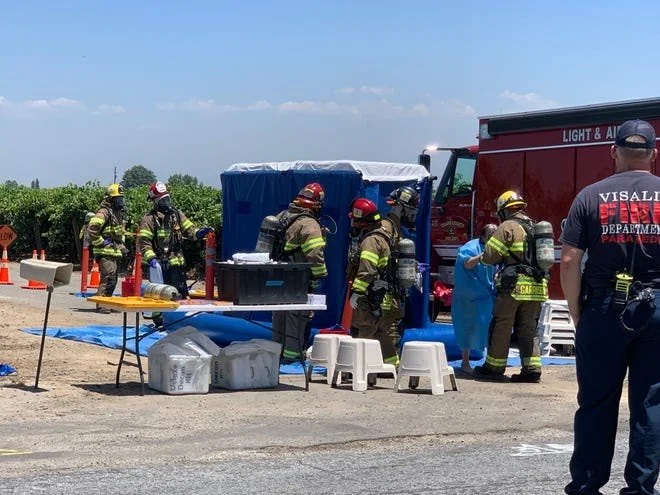Opinion | Pesticides pose severe threat to farming communities
Tulare County Hazmat crews start a mass decontamination of 63 fieldworkers sprayed with pesticides. Photo courtesy of Ron Holman
When I was younger, I believed all of our food magically appeared in grocery stores. I never gave much thought into where it came from; I never felt the need to. I simply snacked on my little Sun Maid Raisins without question.
As I’ve gotten older, I’ve since become aware of the many issues that surround the process of how our food is produced. It is not all sunshine and bright smiles I saw depicted on my Sun Maid Raisin labels. The harsh reality is that many farmworkers ー typically Latinx migrants ー are exposed to harmful pesticides as they harvest the fruits and vegetables that populate the shelves of our local grocery stores.
In few places are the negative consequences of these reckless agricultural practices more pronounced than Tulare County, California, where the pesticide chlorpyrifos is regularly used in farm culture. Chlorpyrifos is a common pesticide used in the U.S. due to its affordability and effectiveness in killing pests. National Pesticide Information Center studies show how brief exposure results in dizziness, nausea, vomiting and headaches.
However, the farmworkers of Tulare County aren’t just exposed to chlorpyrifos briefly; their jobs demand they work in fields treated with the toxic pesticide almost daily. This continuous exposure impacts their everyday lives, often resulting in long-term health problems.
Annika Dinh, freshman graphic design major
Janet Rodriguez, an agricultural worker in Tulare County, explains the warning signs of pesticides were never made clear to her and other Mexican immigrants: “They never told us what these signs meant,” Rodriguez told the press. Because many of the workers did not understand English, they remained unaware of the dangers posed by working with chlorpyrifos.
When we eat, we forget people are literally risking their lives for us to do so. Toxic pesticides are an ongoing problem, and they need to be banned for the sake of not only the farm workers, but for anyone living near the agricultural fields and people who consume the crops.
Although California has recently implemented regulations on pesticides, the chemical is still being used on a wide variety of crops, such as citrus, almonds and grapes. Angel Garcia, a community organizer in Tulare County, claims the new restrictions aren't tough enough; and she’s right. What needs to happen is stricter government regulations to ban harmful pesticides, such as chlorpyrifos, in all states — not just in California.
We know what this pesticide does to people, and it is time to demand safer alternatives.
Moving forward, individuals must continue to raise awareness about the adverse effects of pesticides, educate those who are exposed to these hazardous chemicals and demand stricter regulation on their use and production. We must boycott brands such as Corteva, Inc. which produce chlorpyrifos products and any other dangerous pesticides brands until our voices are heard. Only then will the farm workers of Tulare County receive the justice they deserve.


